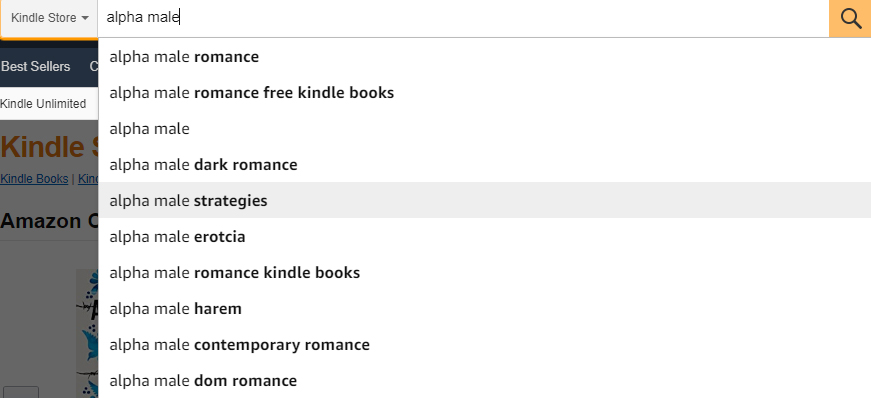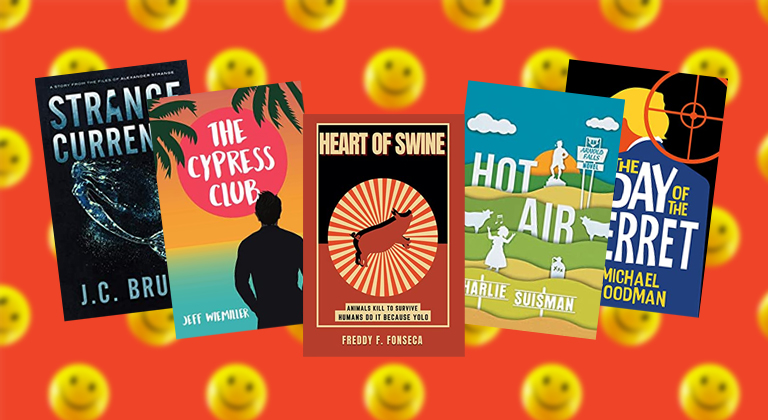The Dirty Secret About Keywords – Part 2
In the first part of this series, Nate laid the foundation for keyword mastery which authors need to understand in order to make sure that casual customers will find their book when using the Amazon search bar. In this conclusion, he plays the part of mad data scientist as he demonstrates how to formulate the keywords for a specific book, while also explaining some best practices on how to organize those keywords effectively, and thoughts on keyword upkeep.
The Promise of the Premise
The first thing to do when you keyword any book is to consider the story at its most basic level, because the premise will tell you the most important thing about your book: who the audience is. So let’s say we have a shifter story about a research scientist who meets her fated mate at an Arctic research base run by polar bear shifters. It’s never too early to start making notes about keywords, and even at this stage we know that our intended audience is people who like paranormal romance, shifters, fated mates, and/or polar bears.
If we flesh out the premise with a few more details, we can further expand our audience. Let’s say that the MC’s ex is the one who requested her presence at the research base. Let’s also say that the research team is studying an ancient saber-toothed tiger shifter they pulled out of the ice, who thaws out and intends to spread a lycanthropic condition to all of humanity via a pathogen. And the book will contain a ton of outrageous sex and violence before our fated pair saves the world and lives happily ever after.
That’s the premise of our book. And knowing it, we can keyword the book almost entirely because we know the people who will likely be the most interested to read it. We’ll start out with our basic audience: paranormal romance, shifters, fated mates, and polar bears, and then we’ll add medical thriller, steamy, action, and science fiction to the mix as well. Now it’s time to take our wide net and start making it smaller.
Categories and Characters
Our keywords so far: paranormal romance, shifters, fated mates, polar bears, medical thriller, steamy, action, science fiction.
Amazon’s category and character keywords are the first stop now that we have our basic terms in mind. Including Amazon’s suggestions will allow Amazon’s algorithms to place our book in our genre’s subcategories, as well as Amazon’s department, character, and theme navigation links (found on the left navigation bar on Amazon, examples shown below but depend on where you’re looking and what you’ve searched on). These are by far the most important keywords we’ll choose for our book, so it pays to spend a little extra time making sure that any that fit the bill for our book are included. Anything can be a keyword, but many genres have specific keywords that will place your book in the various Amazon genre subcategories if you use them (for example, this is the list for romance).
From this list, we’ll use shapeshifter, doctor, love triangle, and menage. We’ll also use alpha male, since there will be plenty of those running around. We’re also going to dip into the keywords for thrillers and science fiction to pick up female protagonist, racy, dark, scary, and love.
Now that we have our base keywords and our Amazon keywords, I like to start organizing them. The idea is that we’ll likely be using these same keywords again and again if we write similar books, so in my experience, it’s best to start with the Amazon-specific keywords, like this:
alpha male, shapeshifter, doctor, love triangle, menage, female protagonist, racy, dark, scary, love
Definitely keep multi-word keywords like alpha male, love triangle, and female protagonist in logical order, meaning the order which will most likely result in an exact match when someone enters terms into the search box. Going forward, we’ll attempt to optimize by placing all of our multi-word keywords in the most logical possible order.
Stranger Search
The next step is to use our base keywords and then use Amazon’s predictive search box to determine some common organic searches. It’s important to use your browser’s incognito or private browsing mode when doing this, otherwise your results will be skewed by your own recent queries, as well as all of the tracking cookies stored on your device. You want the search to treat you like a stranger. Once you’re ready, start entering our base keywords in the Amazon search box, noting the options it gives you to pre-fill. For example, with alpha male, you might get something like this:
Since we know that Amazon’s metadata guidelines for keywords state that words like “free”, “bestselling” are out, and that Amazon is touchy about words like “kindle” and “kindle unlimited” being used, we can ignore those options, even though they are being offered by Amazon. For our book, the only two that really apply are alpha male romance and alpha male contemporary romance. Repeat the process for our other terms to add things like shapeshifter romance and racy romance novels, and then we can plug these new phrases back into the predictive search to refine them even more, picking up terms like alpha male romance possessive.
So Sexy it Hurts
Unfortunately, Amazon can be somewhat punishing when it comes to erotica, preventing books from appearing in searches and blocking them from advertising with AMS. To add insult to injury, it can also be somewhat unpredictable when it comes to forcibly changing a book’s category from romance to erotica depending on the keywords. While support is generally helpful in restoring a book’s proper categories, this is a headache that authors don’t really need. Fortunately, it is also one that can be mostly avoided.
While sweet and Amish romance might not need to worry about sexy keywords, those (like me) who write erotic romance have to walk a fine line between readers being able to logically search for our books and Amazon’s unpredictable whims. Using keywords like erotic or sex can be counterproductive, since they also seem to be some of the most likely terms to cause issues. Instead, terms like steamy, racy, sizzling, and spicy sort of dance around the issue while still being commonly used in searches. Terms like erom also seem to be safe.
Mining Other Sources
Reader communities and industry websites can be excellent places to find keywords. For example, if we examine the tropes of our story, soul mates and forced proximity definitely apply.
Going back to the first part of this series, reading more books in the genre you wish to write will give you a ton of ideas for keywords. Not only will you come to understand the terms that readers might be looking for (like fated mates), but you’ll understand how to more effectively deliver on the promise made when your book popped up in a reader’s search results. If you can deliver, you’ll build trust and a fanbase, who themselves can be an excellent source of potential keywords.
Everything in Order
Now that we have most of our keywords, we can further organize them. Here’s what we have so far:
alpha male, shapeshifter, doctor, love triangle, menage, female protagonist, racy, dark, scary, love, paranormal romance, shifters, fated mates, polar bears, medical thriller, action, science fiction, contemporary romance, possessive, steamy, sizzling, spicy
Right off the bat, we don’t need the single keyword love if we already have love triangle. Repeating words is fine, and you’ll see momentarily that I almost always repeat words to encourage exact matches, but we’re not getting any extra bang from love. Our story is going to be over-the-top when it comes to violence, so I’m also going to add in romantic, violent, and pulp to the mix since readers who are looking for brain candy are exactly those I want to target. We’ll also throw in books, novels, stories, and fiction to round everything out.
When I organize keywords, I like to place descriptor words to the left and nouns to the right, since that’s the most logical way people search. It’s why “medical thriller” isn’t “thriller medical”. So organized in the most logical way, and with duplicate words added to encourage exact matches to searches, our keywords look like this:
alpha male, polar bears shifters, shapeshifter, doctor, love triangle, menage, female protagonist, racy steamy paranormal romance books, possessive fated mates, scary romantic medical thriller books, violent action books, dark romantic science fiction books, steamy contemporary, romance novels, sizzling romance, spicy romance stories, pulp fiction
If we enter these keywords into the Hidden Gems Amazon Keyword Organizer nearly all of the available characters have been used. I don’t tend to bother trying to fill in every single character, since the most important thing to me is making sure that the most likely search terms are used and are organized in the most logical way. But if you have some extra terms that fill up the available spaces it never hurts to add them!
Final Thoughts
If you’ve chosen keywords that people are most likely to use, they become secondary to the importance of your cover and blurb. That means that keywords are almost entirely “set ‘em and forget ‘em”. You’ll almost never have to tinker with them again. There are about a million more productive things to do, like writing a new book!
As always, if you have any questions, feel free to leave a comment. Thanks for reading!












